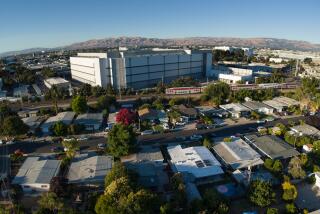Hello, sunshine: Palo Alto utility to pay locals for solar energy
Green energy may be losing momentum inside the Beltway. But officials in the heart of Silicon Valley are betting on the sun.
This week, the Palo Alto City Council approved a plan to buy clean power from local utility customers who install solar panels on their roofs. That’s right. The power company will pay them, not the other way around.
The arrangement – known by the clunky name “feed-in tariff” – is still a rarity in the United States. But Palo Alto officials want to help pioneer the effort. They’ve even rebranded their pay-for-sunshine plan with a clever acronym they hope will catch on: CLEAN (short for Clean Local Energy Accessible Now).
Under a pilot program that will kick off April 2, the City of Palo Alto Utilities will sign 20-year contracts with local producers that will pay them 14 cents per kilowatt-hour.
That’s about double what the utility currently is paying for hydro-electric power, Palo Alto’s single largest source of electricity. But it’s on par with the wind and biogas energy that the city imports from other parts of the region, according to Jon Abendschein, resource planner with City of Palo Alto Utilities.
Plans call for 4 megawatts of solar panels to be installed during the pilot, enough to power about 1,200 homes. Only large commercial projects are eligible for now. But if the test is successful, Palo Alto may expand the opportunity to homeowners.
Cost to a typical ratepayer for the CLEAN pilot: about a penny per month.
“Instead of paying to have the electricity transported hundreds of miles to us, we’re getting people to generate electricity right here,” said Debra Katz, spokeswoman for the utility. “It’s a win on a lot of different levels.”
Palo Alto’s efforts come at a time when many U.S. lawmakers have soured on renewable energy following the Solyndra controversy. Even some Europe nations, where feed-in tariffs are popular, are cutting back because of budget woes.
But green energy advocates are hoping Palo Alto, home to Hewlett-Packard and other technology companies, can show what’s possible despite gridlock on Capitol Hill.
“Local and state leaders are going to drive change in this country,” said John Bernhardt, spokesman for the Clean Coalition, a Bay Area nonprofit. “Palo Alto … is a business-oriented community that has shown a lot of leadership and is at the forefront of many things. … Other communities are going to take notice.”
More to Read
Inside the business of entertainment
The Wide Shot brings you news, analysis and insights on everything from streaming wars to production — and what it all means for the future.
You may occasionally receive promotional content from the Los Angeles Times.










